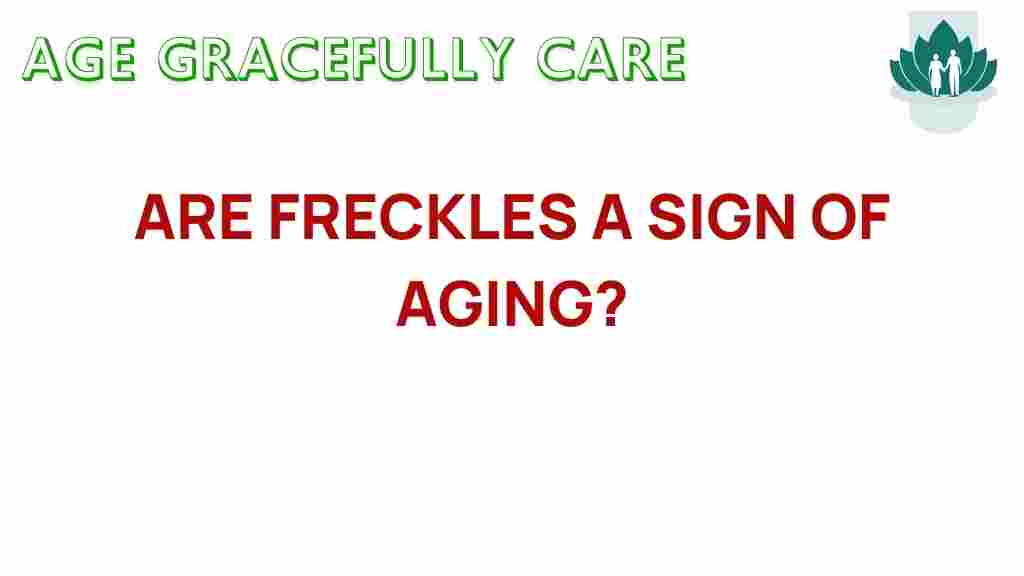Are Freckles a Hidden Clue to Aging Skin?
Freckles are often seen as a charming aspect of one’s appearance, a sign of youthfulness that many people embrace. However, as we age, the role of freckles in relation to our skin health and the aging process becomes increasingly significant. In this article, we will explore the connection between freckles and aging skin, delving into the science behind pigmentation, the effects of sun exposure, and the latest beauty trends in skin care. We will also provide insights from dermatology experts on how to maintain healthy skin as we age.
Understanding Freckles and Skin Pigmentation
Freckles are small, brown spots that typically appear on the skin due to an increase in melanin production. Melanin is the pigment responsible for the color of our skin, hair, and eyes. The presence of freckles is often linked to genetic factors, but sun exposure plays a crucial role as well.
- Genetic Factors: Some individuals are genetically predisposed to develop freckles. This trait is more common in people with fair skin.
- Sun Exposure: Ultraviolet (UV) rays from the sun can stimulate melanin production, leading to the formation of freckles.
The Connection Between Freckles and Aging Skin
As we age, our skin undergoes various changes that can affect its appearance and health. Freckles can serve as a hidden clue to the underlying processes of aging skin.
- Increased Pigmentation: With age, some individuals may notice an increase in freckles or the development of age spots. This is due to cumulative sun exposure over the years.
- Skin Texture Changes: Aging skin loses elasticity, which can make freckles more prominent as the skin thins.
- Sun Damage: Prolonged sun exposure can lead to damage that exacerbates the aging process, resulting in more noticeable freckles.
How Sun Exposure Impacts Skin Health
Sun exposure is one of the most significant contributors to skin aging. Understanding its effects can help us take preventive measures against the development of freckles and other signs of aging skin.
- UV Radiation: UVA and UVB rays can penetrate the skin and cause direct damage to skin cells, leading to premature aging.
- Oxidative Stress: Sun exposure generates free radicals, which can damage collagen and elastin, resulting in wrinkles and sagging skin.
- Inflammatory Response: Repeated sun exposure can trigger inflammatory responses in the skin, leading to pigmentation changes and increased freckles.
Effective Skin Care for Aging Skin with Freckles
To maintain healthy skin and manage the appearance of freckles, adopting a comprehensive skin care routine is essential. Here are some tips based on dermatology recommendations:
- Sun Protection: Use broad-spectrum sunscreen with an SPF of 30 or higher every day, even on cloudy days.
- Moisturization: Keep your skin hydrated with a good moisturizer to combat dryness and maintain elasticity.
- Antioxidants: Incorporate products with antioxidants like Vitamin C and E to help combat oxidative stress.
- Exfoliation: Regular exfoliation can help remove dead skin cells and promote cell turnover, improving skin texture.
- Professional Treatments: Consult a dermatologist for treatments like chemical peels, laser therapy, or microdermabrasion to reduce the appearance of freckles.
Beauty Trends and Freckles
The beauty industry has seen a shift in trends regarding freckles. While some people strive to cover them up, others embrace their natural beauty. Here are some current beauty trends related to freckles:
- Freckle Tattoos: Some individuals opt for semi-permanent tattoos that mimic natural freckles, enhancing their beauty.
- Freckle Makeup: Freckle pens and gels have become popular, allowing people to create faux freckles easily.
- Skinimalism: The trend of minimal makeup emphasizes natural skin textures, including freckles, promoting a more authentic look.
Troubleshooting Common Skin Care Issues
Even with a diligent skin care routine, issues may arise. Here are some common problems and solutions:
- Dry Skin: If your skin feels dry despite moisturizing, consider using a thicker cream or an occlusive agent like petroleum jelly at night.
- Increased Freckles: If you notice a sudden increase in freckles, consult a dermatologist to rule out any underlying conditions.
- Skin Irritation: If new products cause irritation, discontinue use and consult a professional to find suitable alternatives.
Consulting a Dermatologist
For personalized advice and treatment options, consulting a dermatologist is crucial. They can assess your skin health and recommend the best products and procedures tailored to your needs. Regular skin check-ups are also essential, especially if you notice changes in your freckles or any new growths.
For more information on skin health and aging, you can visit this American Academy of Dermatology page.
Conclusion
Freckles can indeed be a hidden clue to aging skin, reflecting the effects of sun exposure and changes in pigmentation. By understanding the relationship between freckles and skin health, we can take proactive steps to care for our skin as we age. Embracing a comprehensive skin care routine and keeping abreast of beauty trends can help us maintain our skin’s vitality and appearance. Remember, while freckles can be a mark of beauty, taking care of our skin is the key to a youthful glow.
Incorporating sun protection, hydration, and professional guidance can ensure that your skin remains healthy and radiant, regardless of age. So, the next time you catch a glimpse of your freckles, remember that they tell a story—one that you can influence with proper care and attention.
This article is in the category Health and created by AgeGracefullyCare Team
